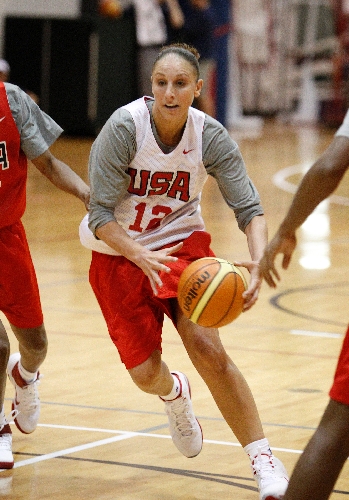Taurasi looks to Olympics

The phone rang, snapping Diana Taurasi out of her deep sleep early on that mid-February morning.
“You never get anything good at 5 in the morning,” Taurasi said Wednesday.
This call, though, was different.
It meant the end to a three-month nightmare that began Nov. 13 with a positive test for a banned substance after a Turkish Basketball Federation game.
The Feb. 16 call was news from that federation informing Taurasi, who maintained her innocence from the beginning, she was cleared.
“It’s really hard when you get accused of something you never did,” Taurasi said. “The situation really bothered me because I’ve been doing all the right things in my career.”
She is in Las Vegas for the U.S. women’s basketball team training camp, which ends today at Cox Pavilion. The clearance from Turkey means Taurasi doesn’t have to worry about being ineligible for next year’s London Olympics.
Taurasi already owns gold medals from the 2004 and 2008 Olympic Games, as well as two WNBA titles with the Phoenix Mercury and three national championships at Connecticut.
The USA Basketball Female Athlete of the Year in 2006 and 2010 doesn’t know how much longer she will pursue Olympic gold. She turns 29 next month.
All her accomplishments were in danger of receiving a giant asterisk after the Turkish league originally said Taurasi tested positive for modafinil, a stimulant intended to help those who have trouble staying awake.
Taurasi immediately said she didn’t take the drug, but many sports fans have heard similar denials from other athletes whose reputations were irreparably harmed by similar allegations.
Sue Bird, who played with Taurasi for two years at UConn and for four in Russia, believed her good friend.
“From Day One, she said, ‘I didn’t do it,’ so from there it was about supporting her,” Bird said. “Everything was pretty much the same as it always was in terms of our friendship.
“When everything happened with the doping situation, you saw her go into a little bit of a hole.”
Finally, Taurasi got the 5 a.m. call. She wasn’t overly jubilant, though, because Taurasi said she believed she never should’ve been in that position.
“I’ve known ‘D’ for as long as anybody, and when she does something she’s not supposed to do, she owns up to it,” said U.S. coach Geno Auriemma, who also coached Taurasi at UConn. “I think she made a lot of fans out of this that maybe weren’t fans before.”
And probably created skeptics, too.
The problem with testing positive for a performance-enhancing drug is even if it’s a faulty reading, the specter of guilt never completely vanishes.
Some fans will always wonder whether Taurasi got away with cheating.
“Probably,” Auriemma said. “To her credit, she’s not worried about that stuff. She knows she can’t change that. She knows that it’s pointless to try.”
Taurasi echoed Auriemma’s words, and she is considering legal action — not for her sake, but for others.
American player Monique Coker also was cleared by the same federation after first testing positive for modafinil.
“This has to be pointed out so it doesn’t happen again,” Taurasi said. “It’s not just going to get stuffed under the carpet.”
Contact reporter Mark Anderson at manderson@reviewjournal.com or 702-387-2914. Follow him on Twitter: @markanderson65.